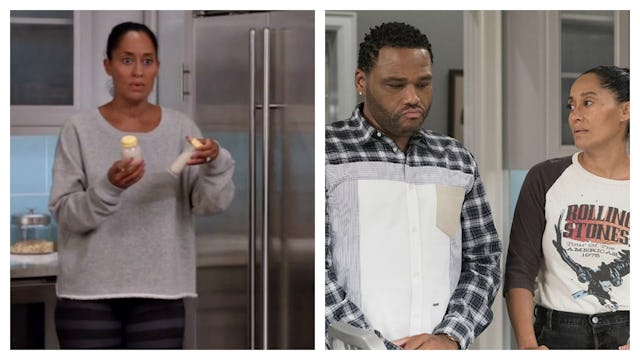Black-ish Is Nailing Modern Motherhood, And We're Here For It

Motherhood isn’t always sunshine and rainbows. Anyone who is a mother knows this. But for some reason, many television shows and movies only show the good parts. And if they do show the not-so-good parts, the character is always seen as “wrong.” If motherhood isn’t coming naturally for them, clearly they’re the problem.
This season, ABC’s black-ish has been tackling motherhood head on, in a really honest, groundbreaking way. We know that they don’t shy away from the issues we face in America, but to see Rainbow really struggling with motherhood is refreshing, and it shows women that there is no “right” way to mother.
In the second episode of the season, it is revealed that Bow is suffering from postpartum depression after the birth of the family’s fifth child. If you recall, baby DeVonte was born prematurely at the end of the third season, and both his and Bow’s lives were in danger. Obviously, they’ve both survived, but now, Bow is experiencing more than just the “baby blues.” Her family is unsure of how to deal with her; they’re used to her being the strong one, the one who holds it all together.
But finally, Dre steps up and takes her to see a doctor. He wants his wife back — the one who used to keep it all together. Of course, there are some comedic moments courtesy of Dre’s ineptitude, but generally the entire episode was raw and honest. Mental health is something that isn’t spoken about enough in the Black community, and for the show to tackle it head on with such honesty proves why the show’s so successful and culturally relevant.
In the episode’s most emotionally gripping scene, Bow finally confronts Dre’s mother Ruby about the way she disrespects her. Ruby has somehow managed to get DeVonte to sleep, and when Bow asks how, Ruby reveals that she gave the baby a bottle of formula. Since Bow is exclusively breastfeeding, this is a huge misstep, and when Ruby insinuates that maybe Bow’s antidepressants are effecting her milk, the line is drawn.
RELATED: The Best Breastfeeding Pads For Preventing Leaks While Nursing
Breastfeeding is still a very complex issue in the Black community. In spite of the obvious health benefits, black women don’t breastfeed at the same rate as other groups of women. The struggle between Black women who choose to breastfeed and their families is huge, because so often they hear “why can’t you just give them formula?” They are accused of not producing enough milk, or something being wrong with their breastfeeding relationship, because of the severe lack of education about breastfeeding in the Black community.
It can be soul crushing for a Black woman to breastfeed, because many of the top critics are right there in her house or are her immediate family. The way Bow’s face just drops when her mother-in-law delivers the news, shows the internal struggle that Black mothers who are committed breastfeeding face when they don’t have a supportive family.
Another episode that will hit close to home for many of us moms is the episode where Bow returns to work. She is a woman who has always taken pride in her job and defines herself (in part) by her profession, so naturally, she is ready to get back to it. In a slightly typical television trope, Dre, having gotten used to having her at home, tries to convince her to continue being a stay at home mom and wife, so that his comforts are maintained. Of course, Bow sees this as insensitive (which it is) and reminds her husband that her career is important to her. She doesn’t have to have either/or, she can have both. And, she is going to do it.
Obviously, life is way more complicated than that.
When she realizes how much time she is missing with her baby, and how life at work has moved on without her, she unsure of how she fits in at either place. When she comes home from work one day to find that the family has changed the baby’s nickname while she is at work, she laments that everything is moving on without her. When Dre yet again suggests that she stop working, she has had enough.
“What do you want me to be? A lady of leisure? Sit on the couch and watch Ellen?” Though she may be using some stereotypes to make a point, we’ll forgive her. “This isn’t just a job for me, Dre, this is who I am!” Rebound, she nails it.
For many working mothers, going to work gives them a sense of purpose outside of motherhood. In fact, many of us will tell you that working makes us better parents.
These brutally honest portrayals of motherhood are dealt with in a way that only black-ish can. They’re the perfect mix of reality and comedy.
There’s another episode this season where Diane gets her first period, and this one is heavier on the comedy, but will have every woman nodding her head through her laughter over the awkwardness of having to wear the “backup pants,” and then the embarrassment that comes from having to reveal to your parents that you’ve gotten your first period. Mom gets all misty-eyed in the maxi-pad aisle, and you just need someone to be normal about it. The episode also features Bow’s mother, so you know it’s bound to be funny.
There are many shows about parenting and family life out there, but so few consistently hit the nail on the head. Black-ish is consistent, and uproariously funny, while bringing to light real issues that need to be addressed in this country. I’m already looking forward to the next episode.
This article was originally published on